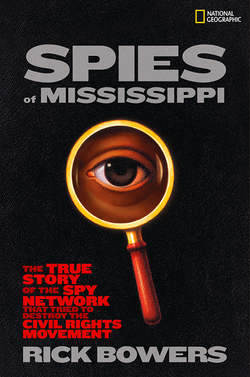Читать книгу Spies of Mississippi: The True Story of the Spy Network that Tried to Destroy the Civil Rights Movement - Rick Bowers - Страница 10
GROWING OUTRAGE, GROWING BACKLASH
ОглавлениеThe segregation watchdogs would have plenty to keep an eye on. From Gulfport to Greenville, civil rights activists had stepped up their boycotts, marches, prayer vigils, and demonstrations against segregation and discrimination, inequality and injustice. The catalyst had been the 1954 U.S. Supreme Court ruling in Brown v. Board of Education, which barred segregation in public schools and required states to integrate schools “with all deliberate speed.” The ruling prompted more and more opponents of segregation to join the National Association for the Advancement of Colored People (NAACP), an interracial organization formed in 1909 to advocate for equal rights for African Americans. Now the NAACP was setting up local chapters in cities and towns throughout Mississippi—and the rest of the country—to push for integration.
The growing outrage of blacks was greeted with a growing backlash from many whites. The more extreme opponents of integration called for a campaign of “massive resistance” by white community leaders and ordinary citizens. City leaders barred demonstrations; county sheriffs began jailing activists on trumped-up charges; the Ku Klux Klan awoke from a long slumber with cross burnings, beatings, and even murder.
Thousands of people were joining the newly formed White Citizens’ Council, a self-described civic organization with a stated mission of defending segregation by legal means—and without violence. The movement was inspired by Mississippi Circuit Court Judge Thomas Pickens Brady, who published a handbook entitled Black Monday, which denounced the 1954 Supreme Court ruling, introduced a racist philosophy, and compared black people to cockroaches and chimpanzees. Brady called for the disbandment of the NAACP and proposed radical alternatives to integrated schools, including the abolition of all public schools and even the creation of a separate state for Negroes.
By the time Governor Coleman took office, the state was studded with White Citizens’ Council chapters. Their leaders saturated their community newspapers with pro-segregation messages, advocated for tougher segregation ordinances, supported segregationist political candidates, and fiercely denounced the NAACP by calling it the National Association for the Agitation of Colored People. The Council’s most effective weapon was the economic advantage that middle- and upper-class whites held over the majority of blacks. Council leaders got suspected civil rights sympathizers fired from their jobs, turned down for credit, forced out of business, or evicted from their homes. Behind the scenes, more than a few Council leaders resorted to threats, intimidation, and violence, as they worked hand in hand with the Klan. Critics of the White Citizens’ Council—noting that most of its leaders were respected white businessmen dressed in suits and ties rather than hoods and robes—dubbed the organization the “Country Club Klan.” Liberal journalist Hodding Carter, editor of the crusading Delta Democrat Times, warned that the most extreme white racists would take control of the council. “When the pot boils,” Carter said, “the scum rises to the top.”
Most black Mississippians were not buying segregation, even if they had to keep their views to low whispers to avoid persecution. Many others were voting with their feet by moving north in search of better jobs and more tolerance. Still others, convinced that the entrenched white political class would never give up power, chose to make the best of it in a black-and-white world. Those few subservient blacks who played up to white authority figures in exchange for preferential treatment were branded Uncle Toms, a term drawn from a fictional character in Harriet Beecher Stowe’s novel Uncle Tom’s Cabin. The term, a badge of shame in the black community, suggested that the person was selling out his or her own people.
The Mississippi State Sovereignty Commission was counting on it.
